Comprehensive Report: Engagement in Professional Nursing - Healthcare
VerifiedAdded on 2020/05/28
|11
|2737
|49
Report
AI Summary
This report provides a comprehensive analysis of professional nursing engagement, addressing key areas such as clinical governance, medication safety, leadership and management, organizational culture, and professional practice. The report explores consumer participation in shaping health service delivery, including strategies for registered nurses to increase patient involvement and improve care planning. It delves into medication safety standards, highlighting risks and strategies for nurses to minimize errors and improve patient outcomes. Leadership skills, including human and conceptual skills, are discussed, along with strategies for nurses to develop these skills. The report examines learning culture within healthcare organizations, emphasizing its characteristics and benefits for patient outcomes. Additionally, the report addresses role ambiguity and its impact on nurses, while also providing self-care strategies for maintaining emotional and physical well-being. The report provides a comprehensive overview of the factors that contribute to effective nursing practice and patient care within a healthcare setting.
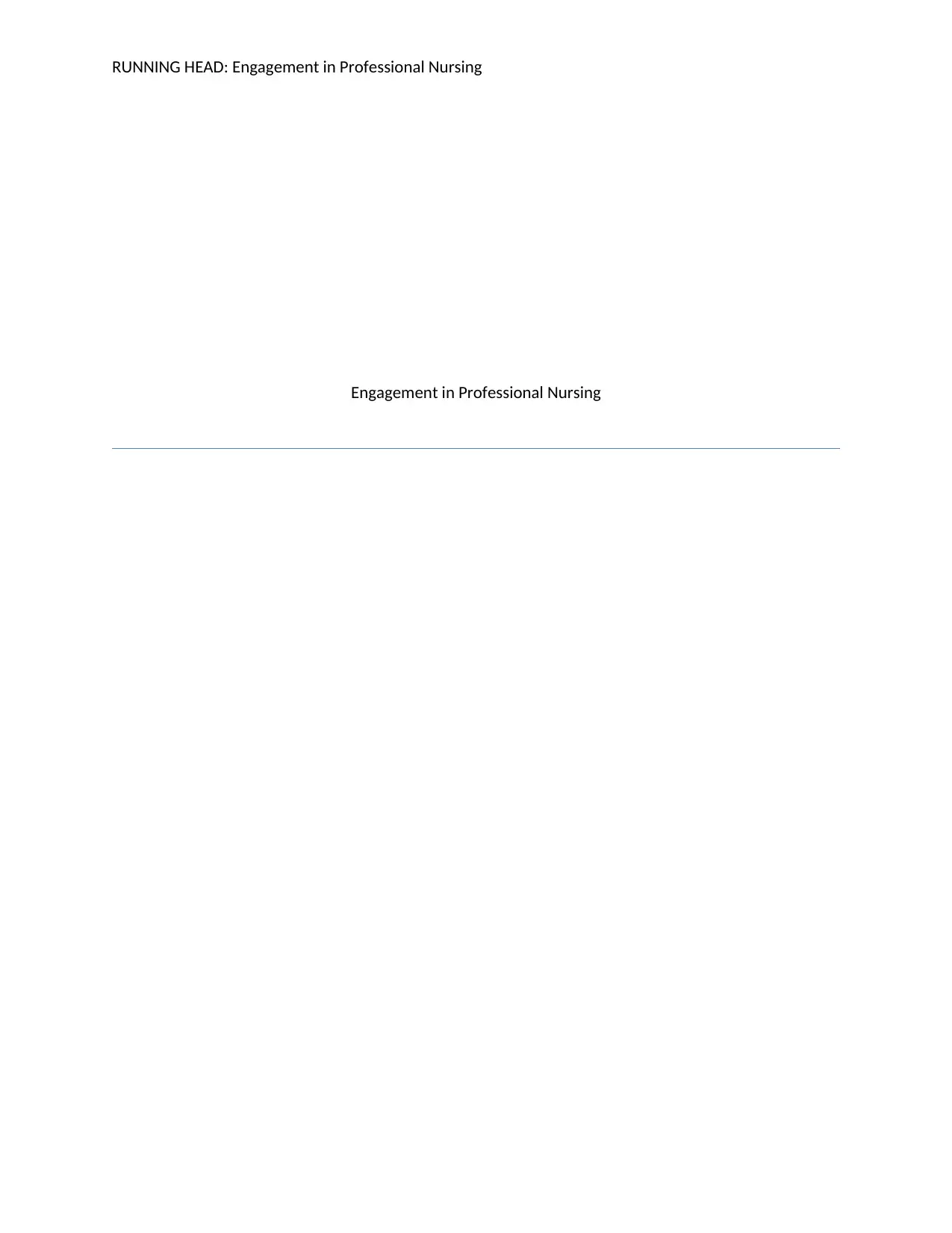
RUNNING HEAD: Engagement in Professional Nursing
Engagement in Professional Nursing
Engagement in Professional Nursing
Paraphrase This Document
Need a fresh take? Get an instant paraphrase of this document with our AI Paraphraser
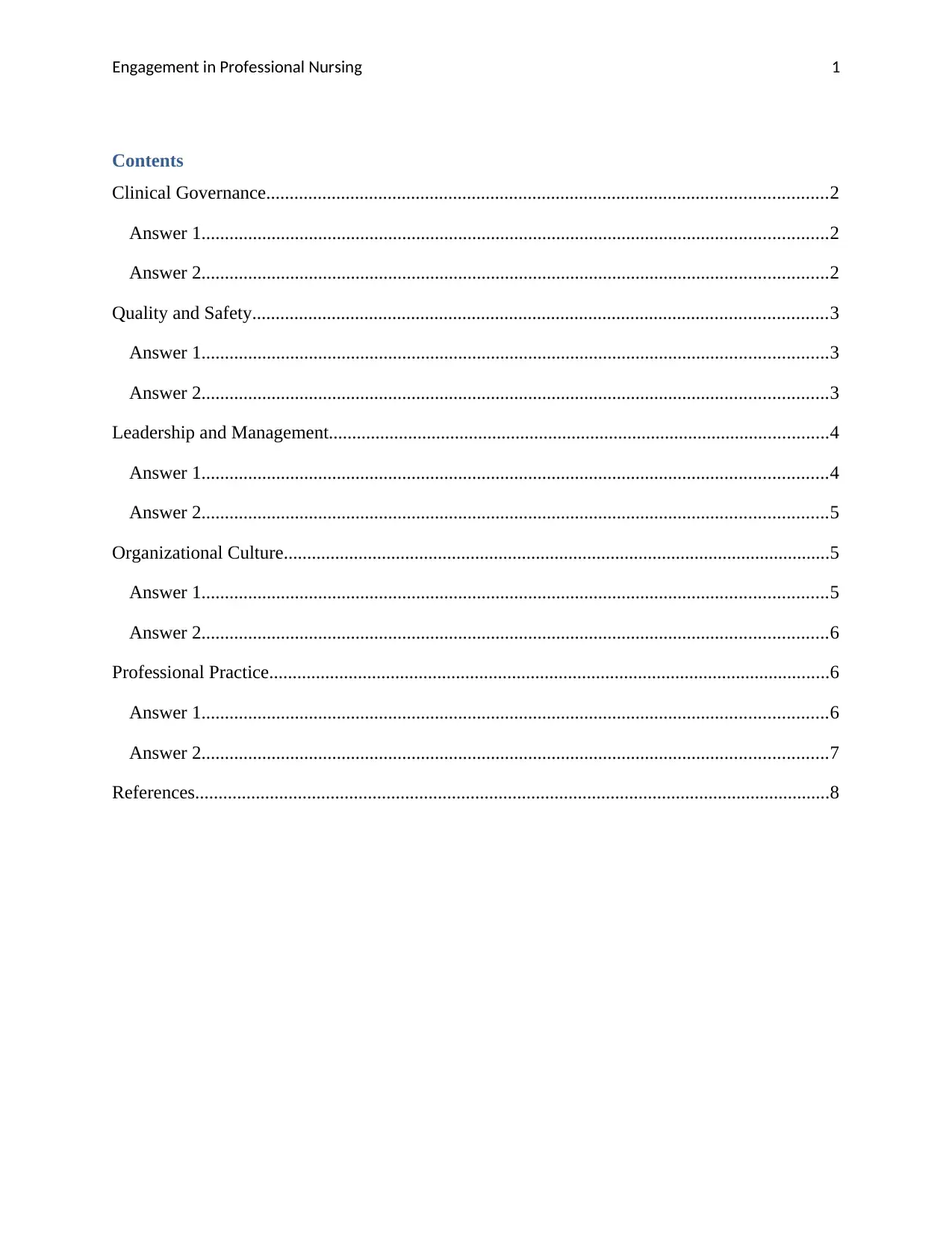
Engagement in Professional Nursing 1
Contents
Clinical Governance........................................................................................................................2
Answer 1......................................................................................................................................2
Answer 2......................................................................................................................................2
Quality and Safety...........................................................................................................................3
Answer 1......................................................................................................................................3
Answer 2......................................................................................................................................3
Leadership and Management...........................................................................................................4
Answer 1......................................................................................................................................4
Answer 2......................................................................................................................................5
Organizational Culture.....................................................................................................................5
Answer 1......................................................................................................................................5
Answer 2......................................................................................................................................6
Professional Practice........................................................................................................................6
Answer 1......................................................................................................................................6
Answer 2......................................................................................................................................7
References........................................................................................................................................8
Contents
Clinical Governance........................................................................................................................2
Answer 1......................................................................................................................................2
Answer 2......................................................................................................................................2
Quality and Safety...........................................................................................................................3
Answer 1......................................................................................................................................3
Answer 2......................................................................................................................................3
Leadership and Management...........................................................................................................4
Answer 1......................................................................................................................................4
Answer 2......................................................................................................................................5
Organizational Culture.....................................................................................................................5
Answer 1......................................................................................................................................5
Answer 2......................................................................................................................................6
Professional Practice........................................................................................................................6
Answer 1......................................................................................................................................6
Answer 2......................................................................................................................................7
References........................................................................................................................................8
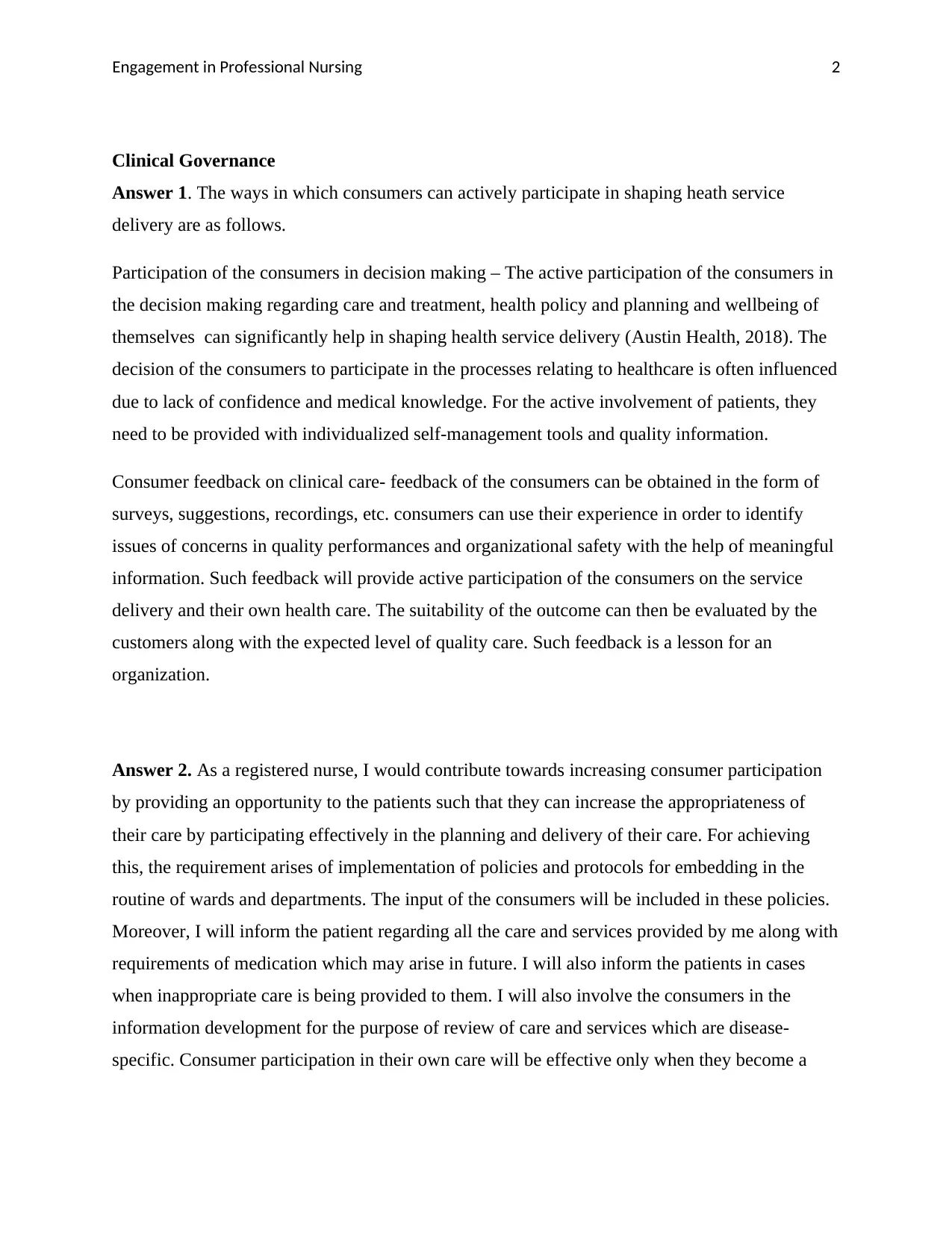
Engagement in Professional Nursing 2
Clinical Governance
Answer 1. The ways in which consumers can actively participate in shaping heath service
delivery are as follows.
Participation of the consumers in decision making – The active participation of the consumers in
the decision making regarding care and treatment, health policy and planning and wellbeing of
themselves can significantly help in shaping health service delivery (Austin Health, 2018). The
decision of the consumers to participate in the processes relating to healthcare is often influenced
due to lack of confidence and medical knowledge. For the active involvement of patients, they
need to be provided with individualized self-management tools and quality information.
Consumer feedback on clinical care- feedback of the consumers can be obtained in the form of
surveys, suggestions, recordings, etc. consumers can use their experience in order to identify
issues of concerns in quality performances and organizational safety with the help of meaningful
information. Such feedback will provide active participation of the consumers on the service
delivery and their own health care. The suitability of the outcome can then be evaluated by the
customers along with the expected level of quality care. Such feedback is a lesson for an
organization.
Answer 2. As a registered nurse, I would contribute towards increasing consumer participation
by providing an opportunity to the patients such that they can increase the appropriateness of
their care by participating effectively in the planning and delivery of their care. For achieving
this, the requirement arises of implementation of policies and protocols for embedding in the
routine of wards and departments. The input of the consumers will be included in these policies.
Moreover, I will inform the patient regarding all the care and services provided by me along with
requirements of medication which may arise in future. I will also inform the patients in cases
when inappropriate care is being provided to them. I will also involve the consumers in the
information development for the purpose of review of care and services which are disease-
specific. Consumer participation in their own care will be effective only when they become a
Clinical Governance
Answer 1. The ways in which consumers can actively participate in shaping heath service
delivery are as follows.
Participation of the consumers in decision making – The active participation of the consumers in
the decision making regarding care and treatment, health policy and planning and wellbeing of
themselves can significantly help in shaping health service delivery (Austin Health, 2018). The
decision of the consumers to participate in the processes relating to healthcare is often influenced
due to lack of confidence and medical knowledge. For the active involvement of patients, they
need to be provided with individualized self-management tools and quality information.
Consumer feedback on clinical care- feedback of the consumers can be obtained in the form of
surveys, suggestions, recordings, etc. consumers can use their experience in order to identify
issues of concerns in quality performances and organizational safety with the help of meaningful
information. Such feedback will provide active participation of the consumers on the service
delivery and their own health care. The suitability of the outcome can then be evaluated by the
customers along with the expected level of quality care. Such feedback is a lesson for an
organization.
Answer 2. As a registered nurse, I would contribute towards increasing consumer participation
by providing an opportunity to the patients such that they can increase the appropriateness of
their care by participating effectively in the planning and delivery of their care. For achieving
this, the requirement arises of implementation of policies and protocols for embedding in the
routine of wards and departments. The input of the consumers will be included in these policies.
Moreover, I will inform the patient regarding all the care and services provided by me along with
requirements of medication which may arise in future. I will also inform the patients in cases
when inappropriate care is being provided to them. I will also involve the consumers in the
information development for the purpose of review of care and services which are disease-
specific. Consumer participation in their own care will be effective only when they become a
⊘ This is a preview!⊘
Do you want full access?
Subscribe today to unlock all pages.

Trusted by 1+ million students worldwide
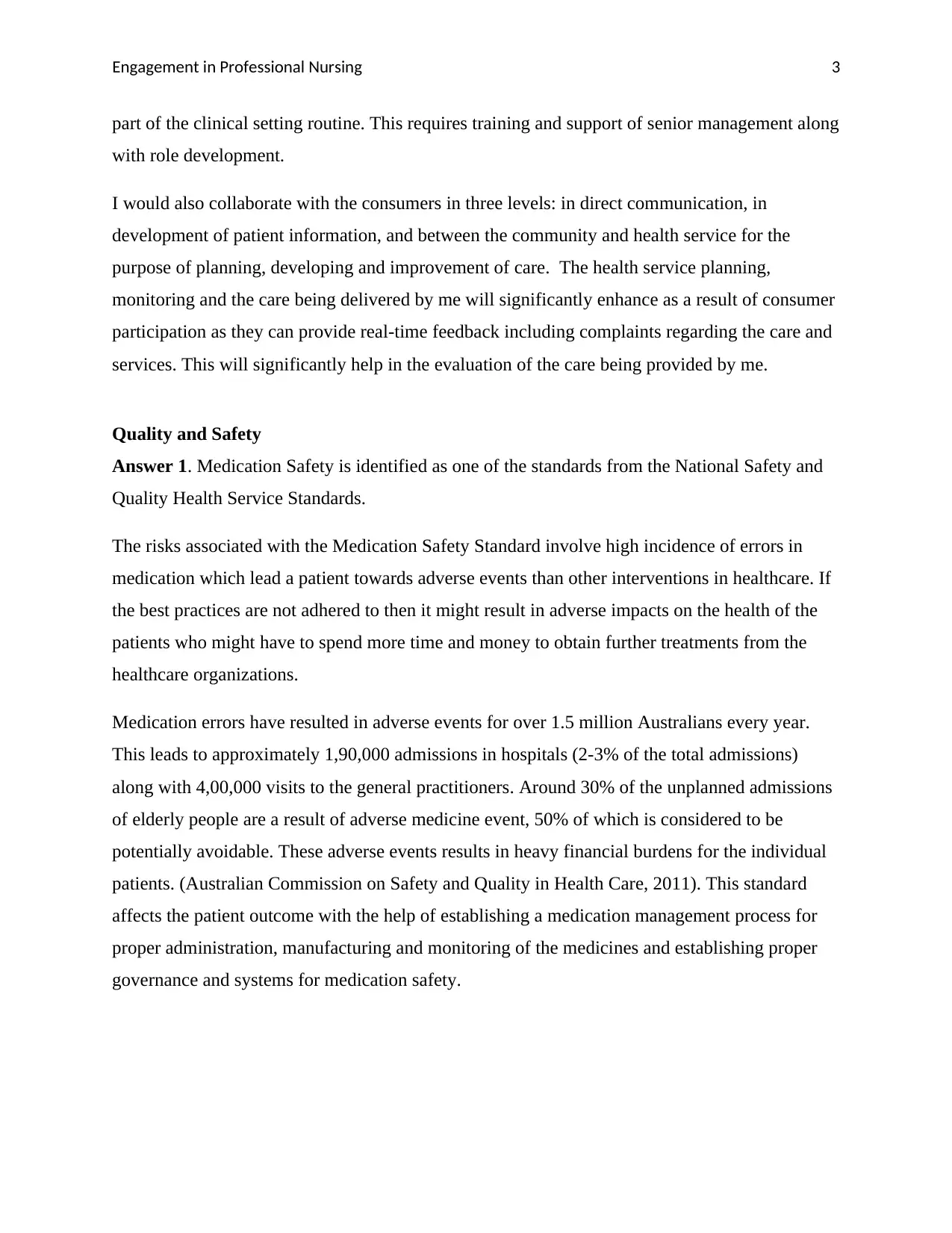
Engagement in Professional Nursing 3
part of the clinical setting routine. This requires training and support of senior management along
with role development.
I would also collaborate with the consumers in three levels: in direct communication, in
development of patient information, and between the community and health service for the
purpose of planning, developing and improvement of care. The health service planning,
monitoring and the care being delivered by me will significantly enhance as a result of consumer
participation as they can provide real-time feedback including complaints regarding the care and
services. This will significantly help in the evaluation of the care being provided by me.
Quality and Safety
Answer 1. Medication Safety is identified as one of the standards from the National Safety and
Quality Health Service Standards.
The risks associated with the Medication Safety Standard involve high incidence of errors in
medication which lead a patient towards adverse events than other interventions in healthcare. If
the best practices are not adhered to then it might result in adverse impacts on the health of the
patients who might have to spend more time and money to obtain further treatments from the
healthcare organizations.
Medication errors have resulted in adverse events for over 1.5 million Australians every year.
This leads to approximately 1,90,000 admissions in hospitals (2-3% of the total admissions)
along with 4,00,000 visits to the general practitioners. Around 30% of the unplanned admissions
of elderly people are a result of adverse medicine event, 50% of which is considered to be
potentially avoidable. These adverse events results in heavy financial burdens for the individual
patients. (Australian Commission on Safety and Quality in Health Care, 2011). This standard
affects the patient outcome with the help of establishing a medication management process for
proper administration, manufacturing and monitoring of the medicines and establishing proper
governance and systems for medication safety.
part of the clinical setting routine. This requires training and support of senior management along
with role development.
I would also collaborate with the consumers in three levels: in direct communication, in
development of patient information, and between the community and health service for the
purpose of planning, developing and improvement of care. The health service planning,
monitoring and the care being delivered by me will significantly enhance as a result of consumer
participation as they can provide real-time feedback including complaints regarding the care and
services. This will significantly help in the evaluation of the care being provided by me.
Quality and Safety
Answer 1. Medication Safety is identified as one of the standards from the National Safety and
Quality Health Service Standards.
The risks associated with the Medication Safety Standard involve high incidence of errors in
medication which lead a patient towards adverse events than other interventions in healthcare. If
the best practices are not adhered to then it might result in adverse impacts on the health of the
patients who might have to spend more time and money to obtain further treatments from the
healthcare organizations.
Medication errors have resulted in adverse events for over 1.5 million Australians every year.
This leads to approximately 1,90,000 admissions in hospitals (2-3% of the total admissions)
along with 4,00,000 visits to the general practitioners. Around 30% of the unplanned admissions
of elderly people are a result of adverse medicine event, 50% of which is considered to be
potentially avoidable. These adverse events results in heavy financial burdens for the individual
patients. (Australian Commission on Safety and Quality in Health Care, 2011). This standard
affects the patient outcome with the help of establishing a medication management process for
proper administration, manufacturing and monitoring of the medicines and establishing proper
governance and systems for medication safety.
Paraphrase This Document
Need a fresh take? Get an instant paraphrase of this document with our AI Paraphraser
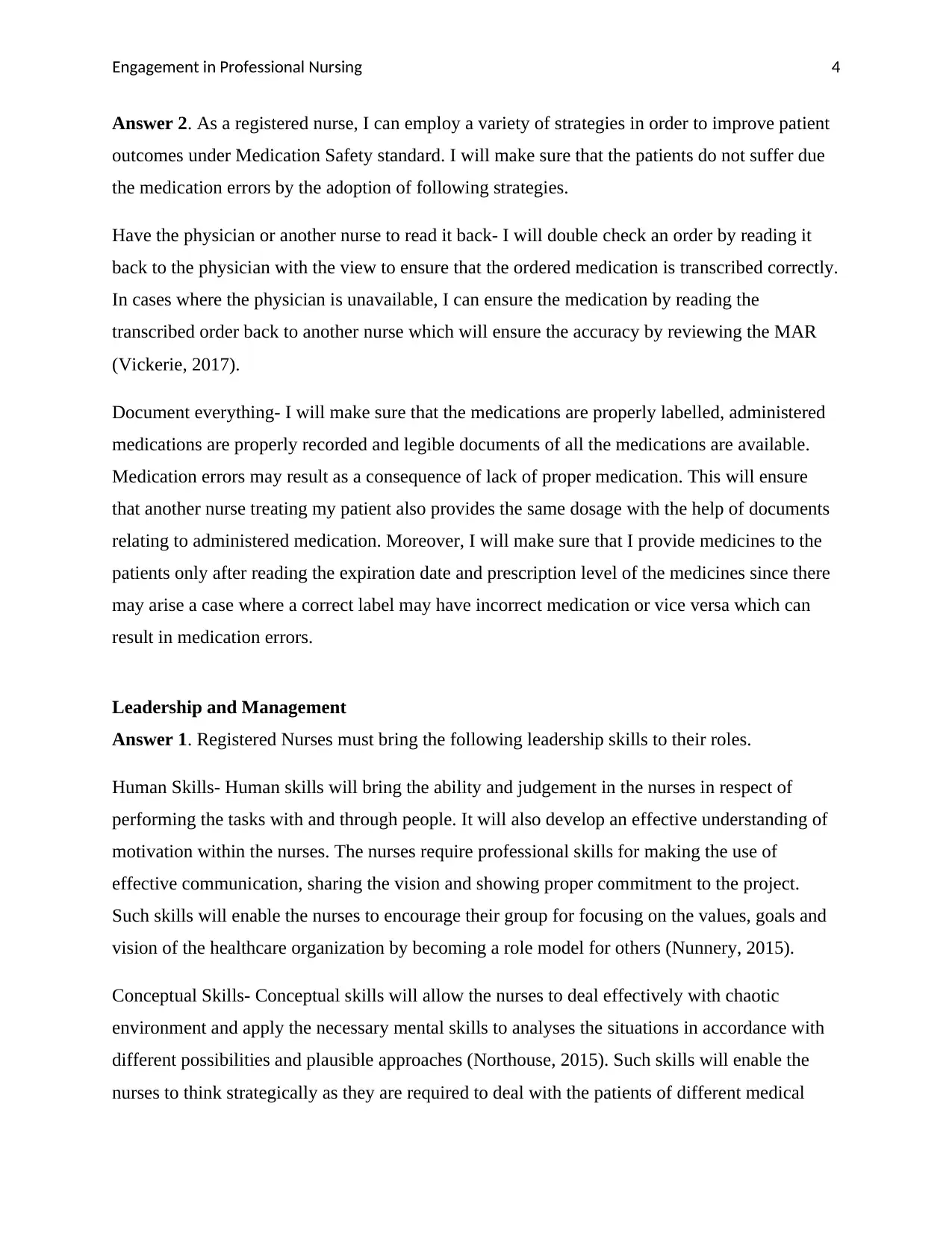
Engagement in Professional Nursing 4
Answer 2. As a registered nurse, I can employ a variety of strategies in order to improve patient
outcomes under Medication Safety standard. I will make sure that the patients do not suffer due
the medication errors by the adoption of following strategies.
Have the physician or another nurse to read it back- I will double check an order by reading it
back to the physician with the view to ensure that the ordered medication is transcribed correctly.
In cases where the physician is unavailable, I can ensure the medication by reading the
transcribed order back to another nurse which will ensure the accuracy by reviewing the MAR
(Vickerie, 2017).
Document everything- I will make sure that the medications are properly labelled, administered
medications are properly recorded and legible documents of all the medications are available.
Medication errors may result as a consequence of lack of proper medication. This will ensure
that another nurse treating my patient also provides the same dosage with the help of documents
relating to administered medication. Moreover, I will make sure that I provide medicines to the
patients only after reading the expiration date and prescription level of the medicines since there
may arise a case where a correct label may have incorrect medication or vice versa which can
result in medication errors.
Leadership and Management
Answer 1. Registered Nurses must bring the following leadership skills to their roles.
Human Skills- Human skills will bring the ability and judgement in the nurses in respect of
performing the tasks with and through people. It will also develop an effective understanding of
motivation within the nurses. The nurses require professional skills for making the use of
effective communication, sharing the vision and showing proper commitment to the project.
Such skills will enable the nurses to encourage their group for focusing on the values, goals and
vision of the healthcare organization by becoming a role model for others (Nunnery, 2015).
Conceptual Skills- Conceptual skills will allow the nurses to deal effectively with chaotic
environment and apply the necessary mental skills to analyses the situations in accordance with
different possibilities and plausible approaches (Northouse, 2015). Such skills will enable the
nurses to think strategically as they are required to deal with the patients of different medical
Answer 2. As a registered nurse, I can employ a variety of strategies in order to improve patient
outcomes under Medication Safety standard. I will make sure that the patients do not suffer due
the medication errors by the adoption of following strategies.
Have the physician or another nurse to read it back- I will double check an order by reading it
back to the physician with the view to ensure that the ordered medication is transcribed correctly.
In cases where the physician is unavailable, I can ensure the medication by reading the
transcribed order back to another nurse which will ensure the accuracy by reviewing the MAR
(Vickerie, 2017).
Document everything- I will make sure that the medications are properly labelled, administered
medications are properly recorded and legible documents of all the medications are available.
Medication errors may result as a consequence of lack of proper medication. This will ensure
that another nurse treating my patient also provides the same dosage with the help of documents
relating to administered medication. Moreover, I will make sure that I provide medicines to the
patients only after reading the expiration date and prescription level of the medicines since there
may arise a case where a correct label may have incorrect medication or vice versa which can
result in medication errors.
Leadership and Management
Answer 1. Registered Nurses must bring the following leadership skills to their roles.
Human Skills- Human skills will bring the ability and judgement in the nurses in respect of
performing the tasks with and through people. It will also develop an effective understanding of
motivation within the nurses. The nurses require professional skills for making the use of
effective communication, sharing the vision and showing proper commitment to the project.
Such skills will enable the nurses to encourage their group for focusing on the values, goals and
vision of the healthcare organization by becoming a role model for others (Nunnery, 2015).
Conceptual Skills- Conceptual skills will allow the nurses to deal effectively with chaotic
environment and apply the necessary mental skills to analyses the situations in accordance with
different possibilities and plausible approaches (Northouse, 2015). Such skills will enable the
nurses to think strategically as they are required to deal with the patients of different medical
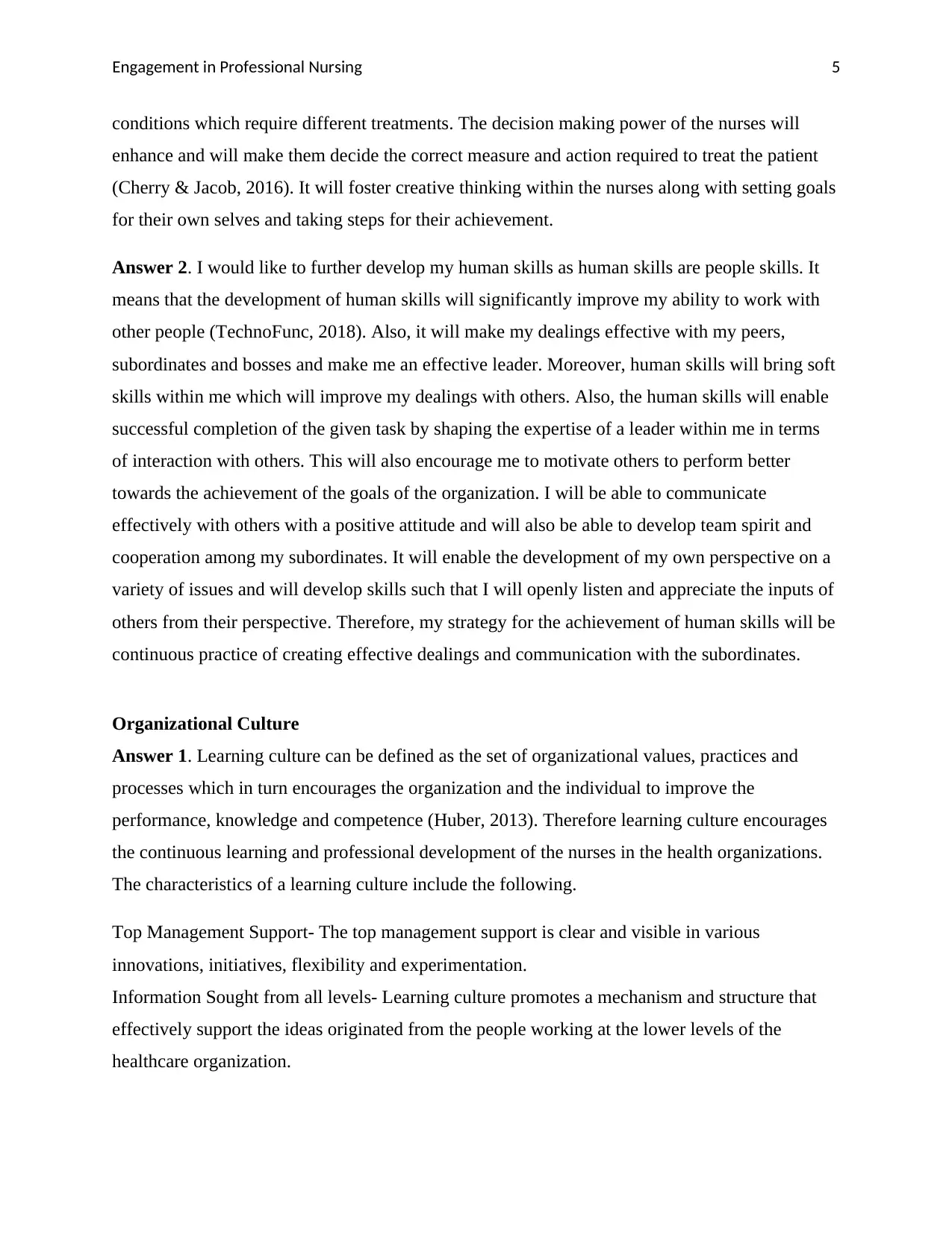
Engagement in Professional Nursing 5
conditions which require different treatments. The decision making power of the nurses will
enhance and will make them decide the correct measure and action required to treat the patient
(Cherry & Jacob, 2016). It will foster creative thinking within the nurses along with setting goals
for their own selves and taking steps for their achievement.
Answer 2. I would like to further develop my human skills as human skills are people skills. It
means that the development of human skills will significantly improve my ability to work with
other people (TechnoFunc, 2018). Also, it will make my dealings effective with my peers,
subordinates and bosses and make me an effective leader. Moreover, human skills will bring soft
skills within me which will improve my dealings with others. Also, the human skills will enable
successful completion of the given task by shaping the expertise of a leader within me in terms
of interaction with others. This will also encourage me to motivate others to perform better
towards the achievement of the goals of the organization. I will be able to communicate
effectively with others with a positive attitude and will also be able to develop team spirit and
cooperation among my subordinates. It will enable the development of my own perspective on a
variety of issues and will develop skills such that I will openly listen and appreciate the inputs of
others from their perspective. Therefore, my strategy for the achievement of human skills will be
continuous practice of creating effective dealings and communication with the subordinates.
Organizational Culture
Answer 1. Learning culture can be defined as the set of organizational values, practices and
processes which in turn encourages the organization and the individual to improve the
performance, knowledge and competence (Huber, 2013). Therefore learning culture encourages
the continuous learning and professional development of the nurses in the health organizations.
The characteristics of a learning culture include the following.
Top Management Support- The top management support is clear and visible in various
innovations, initiatives, flexibility and experimentation.
Information Sought from all levels- Learning culture promotes a mechanism and structure that
effectively support the ideas originated from the people working at the lower levels of the
healthcare organization.
conditions which require different treatments. The decision making power of the nurses will
enhance and will make them decide the correct measure and action required to treat the patient
(Cherry & Jacob, 2016). It will foster creative thinking within the nurses along with setting goals
for their own selves and taking steps for their achievement.
Answer 2. I would like to further develop my human skills as human skills are people skills. It
means that the development of human skills will significantly improve my ability to work with
other people (TechnoFunc, 2018). Also, it will make my dealings effective with my peers,
subordinates and bosses and make me an effective leader. Moreover, human skills will bring soft
skills within me which will improve my dealings with others. Also, the human skills will enable
successful completion of the given task by shaping the expertise of a leader within me in terms
of interaction with others. This will also encourage me to motivate others to perform better
towards the achievement of the goals of the organization. I will be able to communicate
effectively with others with a positive attitude and will also be able to develop team spirit and
cooperation among my subordinates. It will enable the development of my own perspective on a
variety of issues and will develop skills such that I will openly listen and appreciate the inputs of
others from their perspective. Therefore, my strategy for the achievement of human skills will be
continuous practice of creating effective dealings and communication with the subordinates.
Organizational Culture
Answer 1. Learning culture can be defined as the set of organizational values, practices and
processes which in turn encourages the organization and the individual to improve the
performance, knowledge and competence (Huber, 2013). Therefore learning culture encourages
the continuous learning and professional development of the nurses in the health organizations.
The characteristics of a learning culture include the following.
Top Management Support- The top management support is clear and visible in various
innovations, initiatives, flexibility and experimentation.
Information Sought from all levels- Learning culture promotes a mechanism and structure that
effectively support the ideas originated from the people working at the lower levels of the
healthcare organization.
⊘ This is a preview!⊘
Do you want full access?
Subscribe today to unlock all pages.

Trusted by 1+ million students worldwide
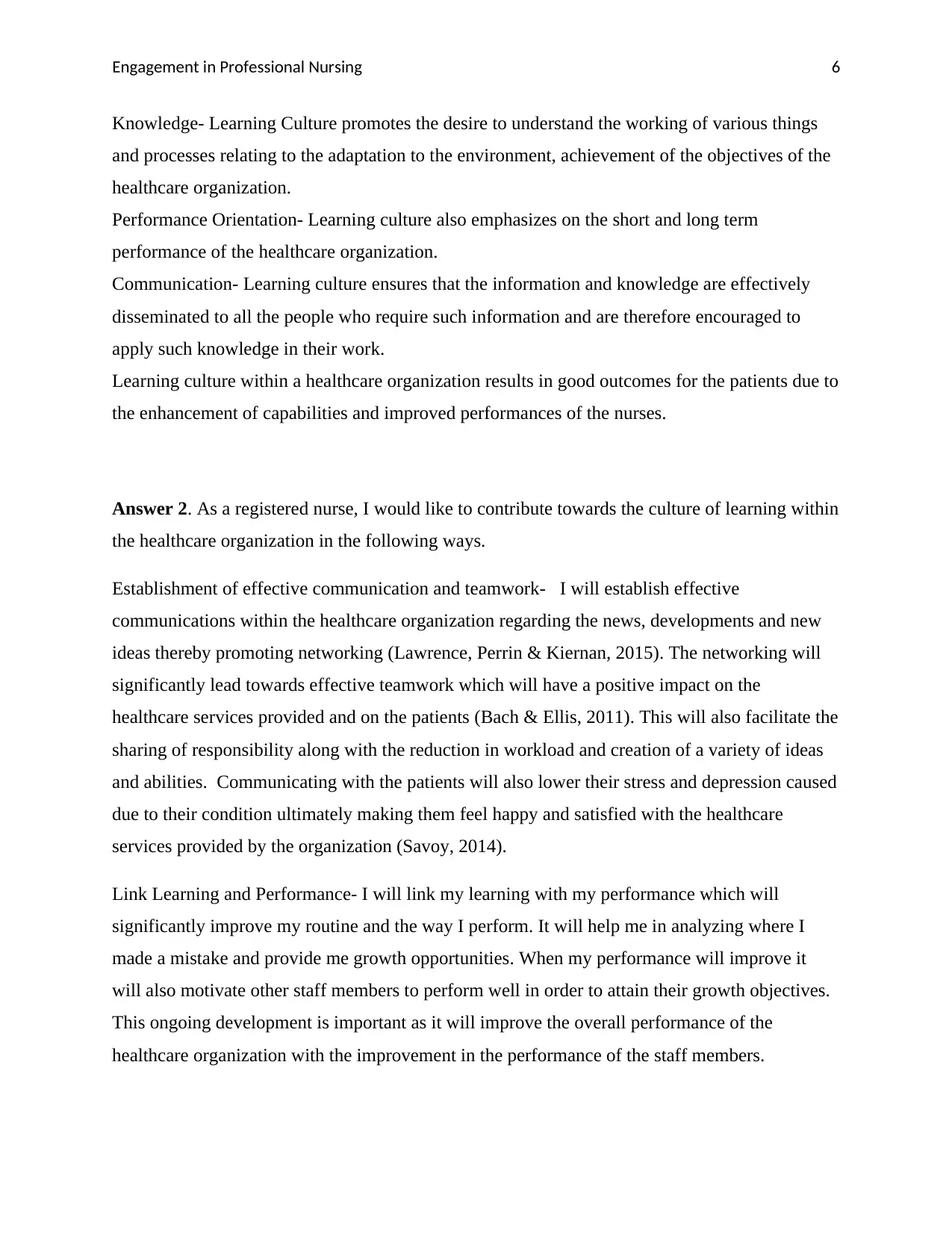
Engagement in Professional Nursing 6
Knowledge- Learning Culture promotes the desire to understand the working of various things
and processes relating to the adaptation to the environment, achievement of the objectives of the
healthcare organization.
Performance Orientation- Learning culture also emphasizes on the short and long term
performance of the healthcare organization.
Communication- Learning culture ensures that the information and knowledge are effectively
disseminated to all the people who require such information and are therefore encouraged to
apply such knowledge in their work.
Learning culture within a healthcare organization results in good outcomes for the patients due to
the enhancement of capabilities and improved performances of the nurses.
Answer 2. As a registered nurse, I would like to contribute towards the culture of learning within
the healthcare organization in the following ways.
Establishment of effective communication and teamwork- I will establish effective
communications within the healthcare organization regarding the news, developments and new
ideas thereby promoting networking (Lawrence, Perrin & Kiernan, 2015). The networking will
significantly lead towards effective teamwork which will have a positive impact on the
healthcare services provided and on the patients (Bach & Ellis, 2011). This will also facilitate the
sharing of responsibility along with the reduction in workload and creation of a variety of ideas
and abilities. Communicating with the patients will also lower their stress and depression caused
due to their condition ultimately making them feel happy and satisfied with the healthcare
services provided by the organization (Savoy, 2014).
Link Learning and Performance- I will link my learning with my performance which will
significantly improve my routine and the way I perform. It will help me in analyzing where I
made a mistake and provide me growth opportunities. When my performance will improve it
will also motivate other staff members to perform well in order to attain their growth objectives.
This ongoing development is important as it will improve the overall performance of the
healthcare organization with the improvement in the performance of the staff members.
Knowledge- Learning Culture promotes the desire to understand the working of various things
and processes relating to the adaptation to the environment, achievement of the objectives of the
healthcare organization.
Performance Orientation- Learning culture also emphasizes on the short and long term
performance of the healthcare organization.
Communication- Learning culture ensures that the information and knowledge are effectively
disseminated to all the people who require such information and are therefore encouraged to
apply such knowledge in their work.
Learning culture within a healthcare organization results in good outcomes for the patients due to
the enhancement of capabilities and improved performances of the nurses.
Answer 2. As a registered nurse, I would like to contribute towards the culture of learning within
the healthcare organization in the following ways.
Establishment of effective communication and teamwork- I will establish effective
communications within the healthcare organization regarding the news, developments and new
ideas thereby promoting networking (Lawrence, Perrin & Kiernan, 2015). The networking will
significantly lead towards effective teamwork which will have a positive impact on the
healthcare services provided and on the patients (Bach & Ellis, 2011). This will also facilitate the
sharing of responsibility along with the reduction in workload and creation of a variety of ideas
and abilities. Communicating with the patients will also lower their stress and depression caused
due to their condition ultimately making them feel happy and satisfied with the healthcare
services provided by the organization (Savoy, 2014).
Link Learning and Performance- I will link my learning with my performance which will
significantly improve my routine and the way I perform. It will help me in analyzing where I
made a mistake and provide me growth opportunities. When my performance will improve it
will also motivate other staff members to perform well in order to attain their growth objectives.
This ongoing development is important as it will improve the overall performance of the
healthcare organization with the improvement in the performance of the staff members.
Paraphrase This Document
Need a fresh take? Get an instant paraphrase of this document with our AI Paraphraser
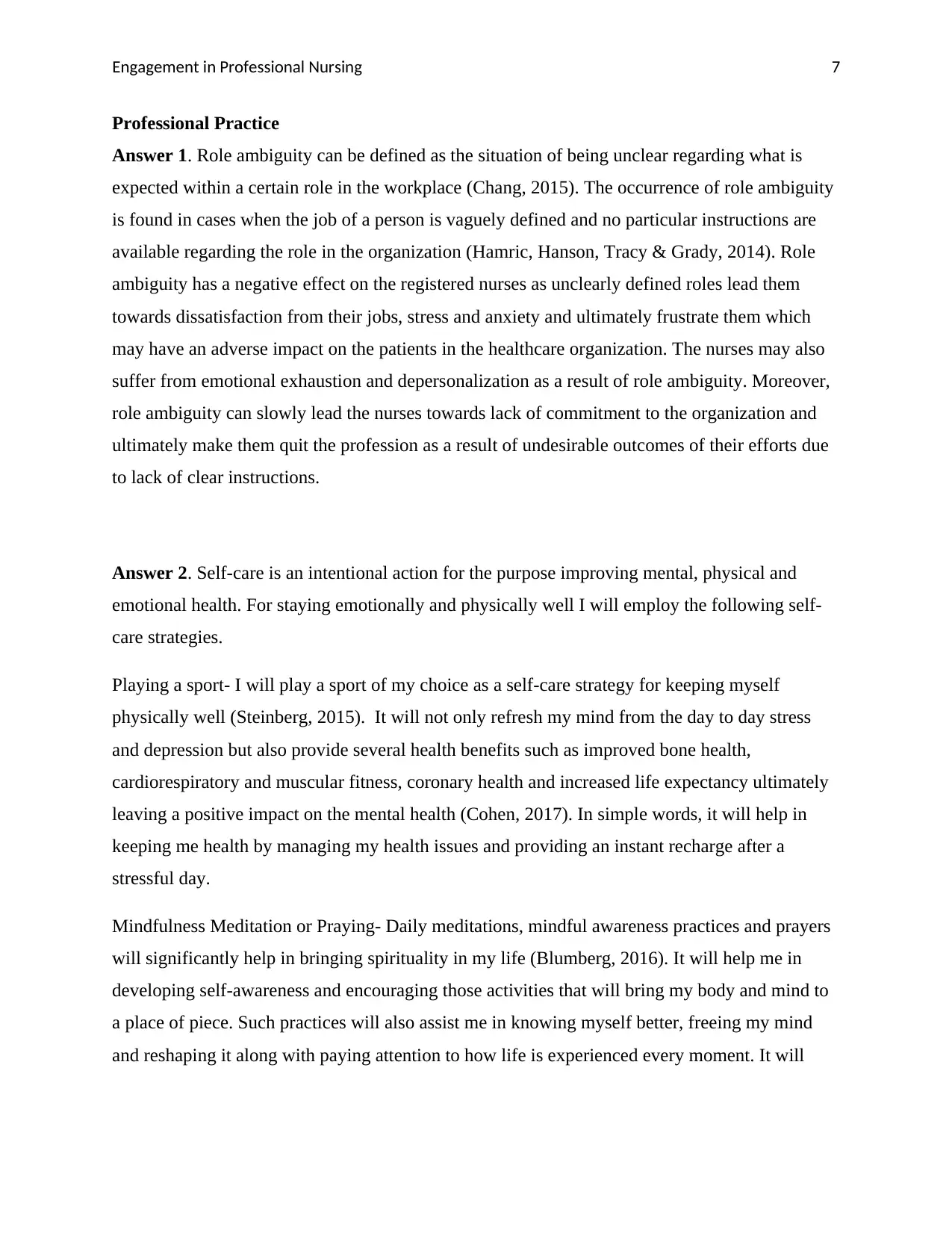
Engagement in Professional Nursing 7
Professional Practice
Answer 1. Role ambiguity can be defined as the situation of being unclear regarding what is
expected within a certain role in the workplace (Chang, 2015). The occurrence of role ambiguity
is found in cases when the job of a person is vaguely defined and no particular instructions are
available regarding the role in the organization (Hamric, Hanson, Tracy & Grady, 2014). Role
ambiguity has a negative effect on the registered nurses as unclearly defined roles lead them
towards dissatisfaction from their jobs, stress and anxiety and ultimately frustrate them which
may have an adverse impact on the patients in the healthcare organization. The nurses may also
suffer from emotional exhaustion and depersonalization as a result of role ambiguity. Moreover,
role ambiguity can slowly lead the nurses towards lack of commitment to the organization and
ultimately make them quit the profession as a result of undesirable outcomes of their efforts due
to lack of clear instructions.
Answer 2. Self-care is an intentional action for the purpose improving mental, physical and
emotional health. For staying emotionally and physically well I will employ the following self-
care strategies.
Playing a sport- I will play a sport of my choice as a self-care strategy for keeping myself
physically well (Steinberg, 2015). It will not only refresh my mind from the day to day stress
and depression but also provide several health benefits such as improved bone health,
cardiorespiratory and muscular fitness, coronary health and increased life expectancy ultimately
leaving a positive impact on the mental health (Cohen, 2017). In simple words, it will help in
keeping me health by managing my health issues and providing an instant recharge after a
stressful day.
Mindfulness Meditation or Praying- Daily meditations, mindful awareness practices and prayers
will significantly help in bringing spirituality in my life (Blumberg, 2016). It will help me in
developing self-awareness and encouraging those activities that will bring my body and mind to
a place of piece. Such practices will also assist me in knowing myself better, freeing my mind
and reshaping it along with paying attention to how life is experienced every moment. It will
Professional Practice
Answer 1. Role ambiguity can be defined as the situation of being unclear regarding what is
expected within a certain role in the workplace (Chang, 2015). The occurrence of role ambiguity
is found in cases when the job of a person is vaguely defined and no particular instructions are
available regarding the role in the organization (Hamric, Hanson, Tracy & Grady, 2014). Role
ambiguity has a negative effect on the registered nurses as unclearly defined roles lead them
towards dissatisfaction from their jobs, stress and anxiety and ultimately frustrate them which
may have an adverse impact on the patients in the healthcare organization. The nurses may also
suffer from emotional exhaustion and depersonalization as a result of role ambiguity. Moreover,
role ambiguity can slowly lead the nurses towards lack of commitment to the organization and
ultimately make them quit the profession as a result of undesirable outcomes of their efforts due
to lack of clear instructions.
Answer 2. Self-care is an intentional action for the purpose improving mental, physical and
emotional health. For staying emotionally and physically well I will employ the following self-
care strategies.
Playing a sport- I will play a sport of my choice as a self-care strategy for keeping myself
physically well (Steinberg, 2015). It will not only refresh my mind from the day to day stress
and depression but also provide several health benefits such as improved bone health,
cardiorespiratory and muscular fitness, coronary health and increased life expectancy ultimately
leaving a positive impact on the mental health (Cohen, 2017). In simple words, it will help in
keeping me health by managing my health issues and providing an instant recharge after a
stressful day.
Mindfulness Meditation or Praying- Daily meditations, mindful awareness practices and prayers
will significantly help in bringing spirituality in my life (Blumberg, 2016). It will help me in
developing self-awareness and encouraging those activities that will bring my body and mind to
a place of piece. Such practices will also assist me in knowing myself better, freeing my mind
and reshaping it along with paying attention to how life is experienced every moment. It will
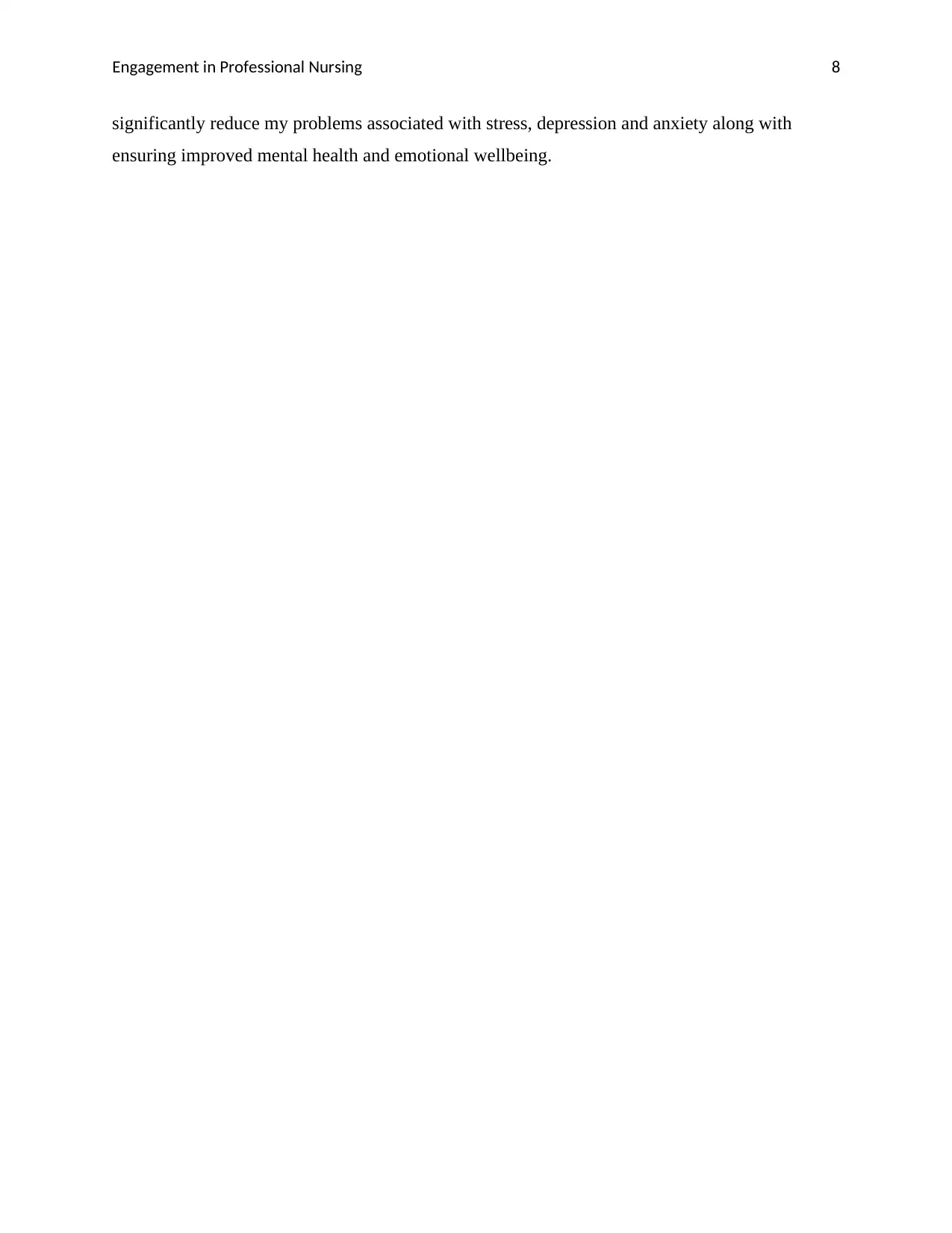
Engagement in Professional Nursing 8
significantly reduce my problems associated with stress, depression and anxiety along with
ensuring improved mental health and emotional wellbeing.
significantly reduce my problems associated with stress, depression and anxiety along with
ensuring improved mental health and emotional wellbeing.
⊘ This is a preview!⊘
Do you want full access?
Subscribe today to unlock all pages.

Trusted by 1+ million students worldwide
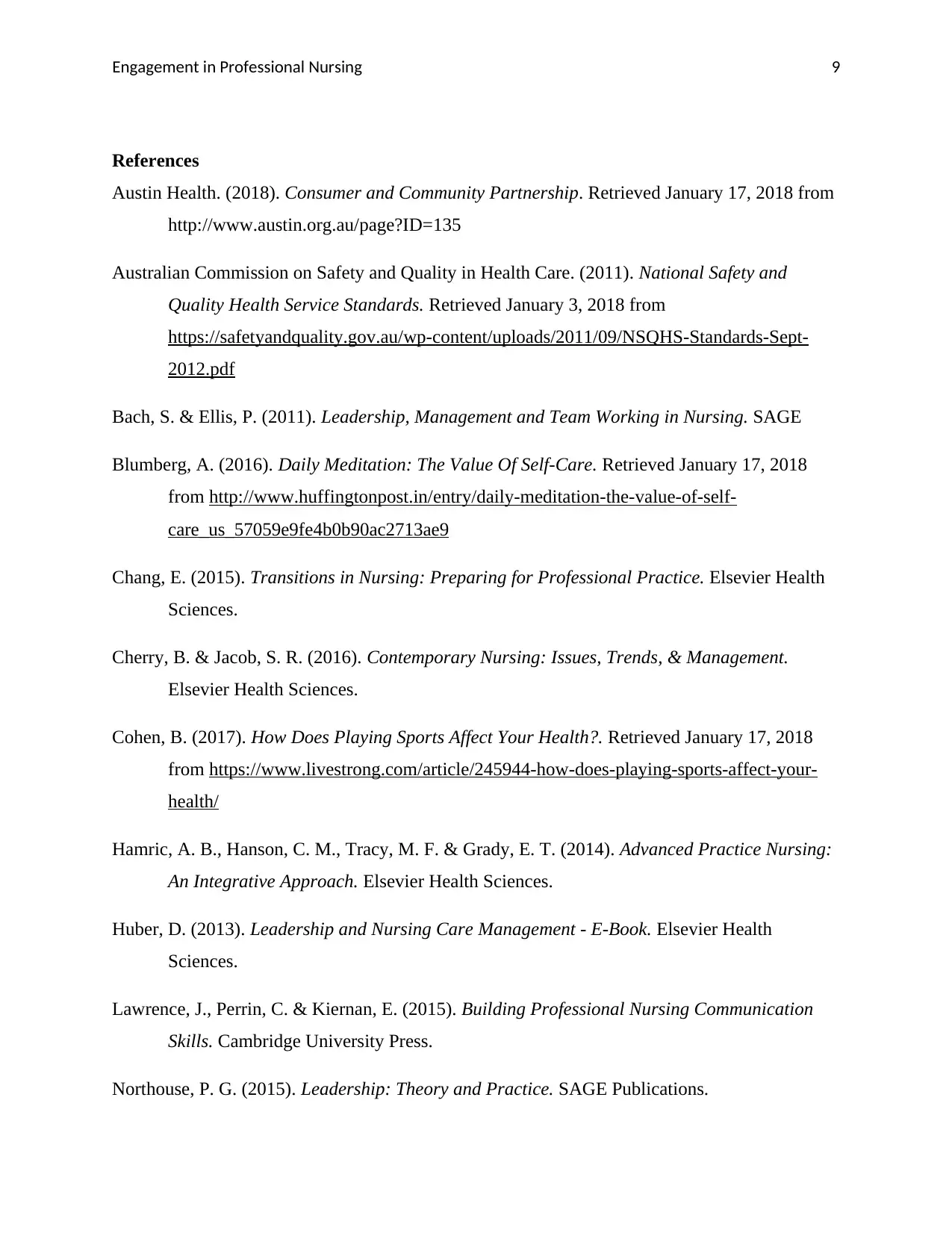
Engagement in Professional Nursing 9
References
Austin Health. (2018). Consumer and Community Partnership. Retrieved January 17, 2018 from
http://www.austin.org.au/page?ID=135
Australian Commission on Safety and Quality in Health Care. (2011). National Safety and
Quality Health Service Standards. Retrieved January 3, 2018 from
https://safetyandquality.gov.au/wp-content/uploads/2011/09/NSQHS-Standards-Sept-
2012.pdf
Bach, S. & Ellis, P. (2011). Leadership, Management and Team Working in Nursing. SAGE
Blumberg, A. (2016). Daily Meditation: The Value Of Self-Care. Retrieved January 17, 2018
from http://www.huffingtonpost.in/entry/daily-meditation-the-value-of-self-
care_us_57059e9fe4b0b90ac2713ae9
Chang, E. (2015). Transitions in Nursing: Preparing for Professional Practice. Elsevier Health
Sciences.
Cherry, B. & Jacob, S. R. (2016). Contemporary Nursing: Issues, Trends, & Management.
Elsevier Health Sciences.
Cohen, B. (2017). How Does Playing Sports Affect Your Health?. Retrieved January 17, 2018
from https://www.livestrong.com/article/245944-how-does-playing-sports-affect-your-
health/
Hamric, A. B., Hanson, C. M., Tracy, M. F. & Grady, E. T. (2014). Advanced Practice Nursing:
An Integrative Approach. Elsevier Health Sciences.
Huber, D. (2013). Leadership and Nursing Care Management - E-Book. Elsevier Health
Sciences.
Lawrence, J., Perrin, C. & Kiernan, E. (2015). Building Professional Nursing Communication
Skills. Cambridge University Press.
Northouse, P. G. (2015). Leadership: Theory and Practice. SAGE Publications.
References
Austin Health. (2018). Consumer and Community Partnership. Retrieved January 17, 2018 from
http://www.austin.org.au/page?ID=135
Australian Commission on Safety and Quality in Health Care. (2011). National Safety and
Quality Health Service Standards. Retrieved January 3, 2018 from
https://safetyandquality.gov.au/wp-content/uploads/2011/09/NSQHS-Standards-Sept-
2012.pdf
Bach, S. & Ellis, P. (2011). Leadership, Management and Team Working in Nursing. SAGE
Blumberg, A. (2016). Daily Meditation: The Value Of Self-Care. Retrieved January 17, 2018
from http://www.huffingtonpost.in/entry/daily-meditation-the-value-of-self-
care_us_57059e9fe4b0b90ac2713ae9
Chang, E. (2015). Transitions in Nursing: Preparing for Professional Practice. Elsevier Health
Sciences.
Cherry, B. & Jacob, S. R. (2016). Contemporary Nursing: Issues, Trends, & Management.
Elsevier Health Sciences.
Cohen, B. (2017). How Does Playing Sports Affect Your Health?. Retrieved January 17, 2018
from https://www.livestrong.com/article/245944-how-does-playing-sports-affect-your-
health/
Hamric, A. B., Hanson, C. M., Tracy, M. F. & Grady, E. T. (2014). Advanced Practice Nursing:
An Integrative Approach. Elsevier Health Sciences.
Huber, D. (2013). Leadership and Nursing Care Management - E-Book. Elsevier Health
Sciences.
Lawrence, J., Perrin, C. & Kiernan, E. (2015). Building Professional Nursing Communication
Skills. Cambridge University Press.
Northouse, P. G. (2015). Leadership: Theory and Practice. SAGE Publications.
Paraphrase This Document
Need a fresh take? Get an instant paraphrase of this document with our AI Paraphraser
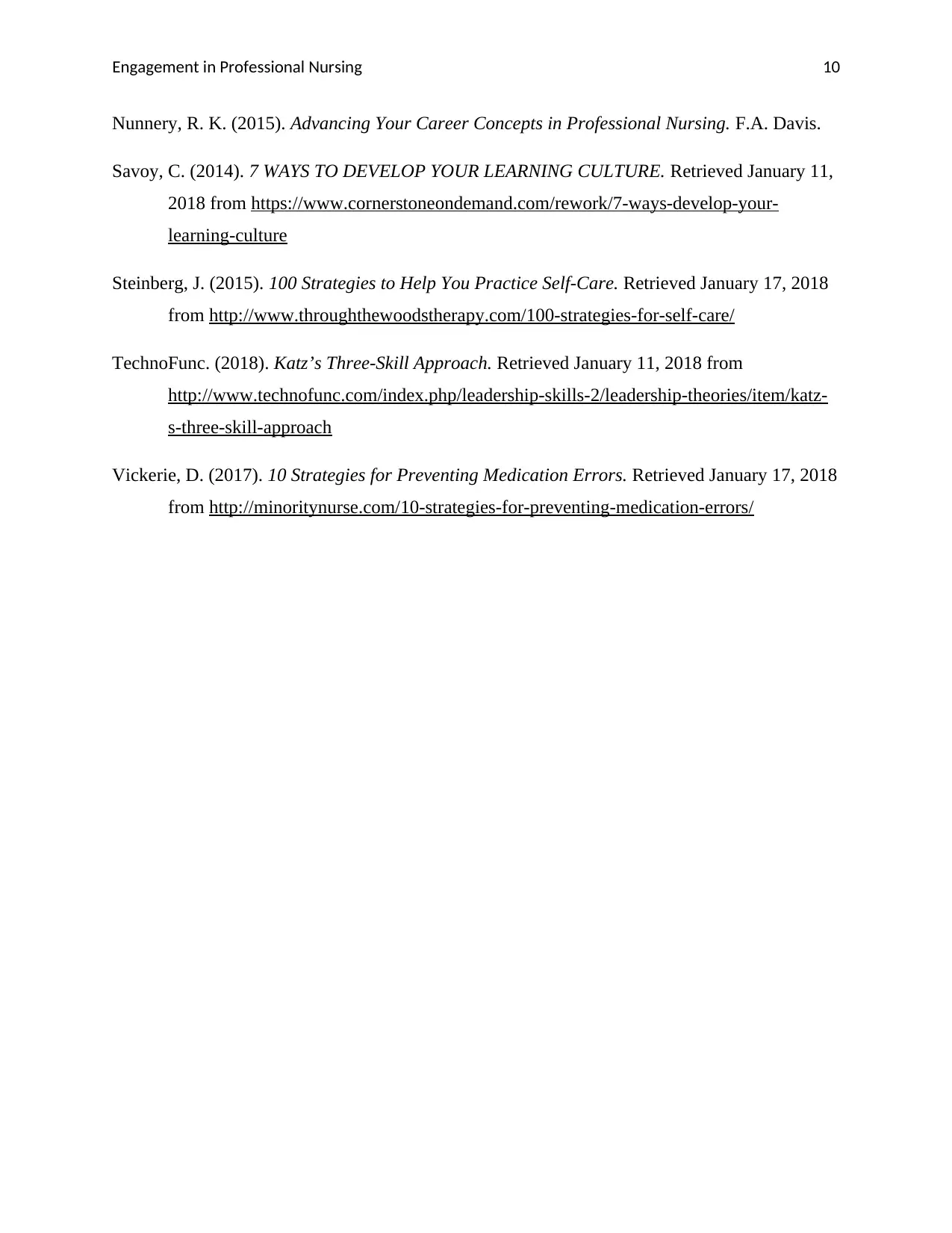
Engagement in Professional Nursing 10
Nunnery, R. K. (2015). Advancing Your Career Concepts in Professional Nursing. F.A. Davis.
Savoy, C. (2014). 7 WAYS TO DEVELOP YOUR LEARNING CULTURE. Retrieved January 11,
2018 from https://www.cornerstoneondemand.com/rework/7-ways-develop-your-
learning-culture
Steinberg, J. (2015). 100 Strategies to Help You Practice Self-Care. Retrieved January 17, 2018
from http://www.throughthewoodstherapy.com/100-strategies-for-self-care/
TechnoFunc. (2018). Katz’s Three-Skill Approach. Retrieved January 11, 2018 from
http://www.technofunc.com/index.php/leadership-skills-2/leadership-theories/item/katz-
s-three-skill-approach
Vickerie, D. (2017). 10 Strategies for Preventing Medication Errors. Retrieved January 17, 2018
from http://minoritynurse.com/10-strategies-for-preventing-medication-errors/
Nunnery, R. K. (2015). Advancing Your Career Concepts in Professional Nursing. F.A. Davis.
Savoy, C. (2014). 7 WAYS TO DEVELOP YOUR LEARNING CULTURE. Retrieved January 11,
2018 from https://www.cornerstoneondemand.com/rework/7-ways-develop-your-
learning-culture
Steinberg, J. (2015). 100 Strategies to Help You Practice Self-Care. Retrieved January 17, 2018
from http://www.throughthewoodstherapy.com/100-strategies-for-self-care/
TechnoFunc. (2018). Katz’s Three-Skill Approach. Retrieved January 11, 2018 from
http://www.technofunc.com/index.php/leadership-skills-2/leadership-theories/item/katz-
s-three-skill-approach
Vickerie, D. (2017). 10 Strategies for Preventing Medication Errors. Retrieved January 17, 2018
from http://minoritynurse.com/10-strategies-for-preventing-medication-errors/
1 out of 11
Related Documents
Your All-in-One AI-Powered Toolkit for Academic Success.
+13062052269
info@desklib.com
Available 24*7 on WhatsApp / Email
![[object Object]](/_next/static/media/star-bottom.7253800d.svg)
Unlock your academic potential
Copyright © 2020–2025 A2Z Services. All Rights Reserved. Developed and managed by ZUCOL.





